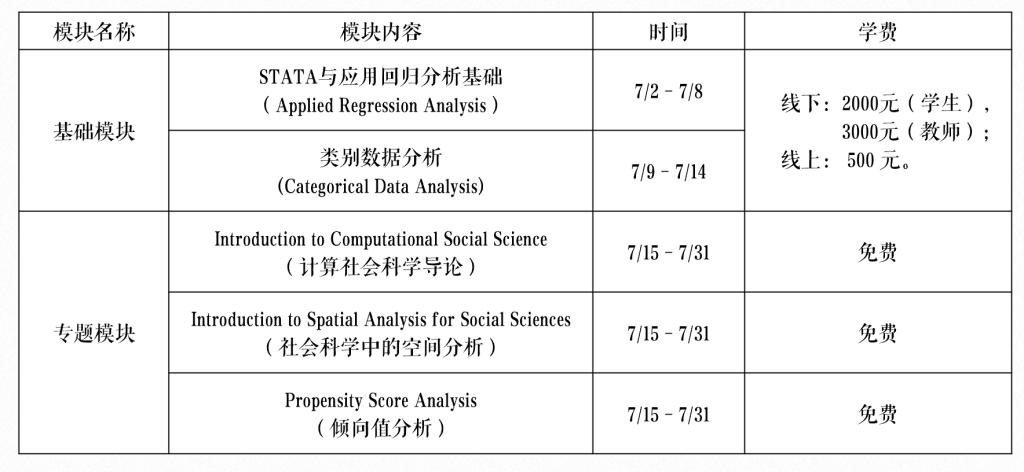第10屆·應用社會科學研究方法研修班 簡章
(暑期班·2021·上海)
時間🙇🏻:2021年7月2日 – 7月31日
主辦: 意昂3
上海紐約大學應用社會經濟研究中心
協辦🏞🙆🏿:意昂3官网數據科學與都市研究中心
意昂3官网上海社會科學調查中心
為推動中國社會學定量研究方法的教學▫️,加快培養應用社會科學研究的人才👩🏫,促進教學和研究資源的地區均衡分布,意昂3與香港科技大學應用社會經濟研究中心自2012年夏季開始, 聯合舉辦《應用社會科學研究方法研修班》,至今已經成功舉辦9屆17期“暑期班”與“冬季班”🙍🏼♂️,參訓學員超5000人次, 來自全國各個省份以及歐美的300多所高校與科研機構。
2021年暑期,意昂3與新成立的上海紐約大學應用社會經濟研究中心將在上海繼續舉辦《第10屆·應用社會科學研究方法研修班·暑期班》,邀請南京大學意昂3体育吳愈曉教授、澳門大學社會學副教授蔡天驥博士✍🏼、美國聖路易斯華盛頓大學社會工作意昂3郭申陽教授、美國內華達大學公共衛生意昂3林戈教授🎂、依阿華大學社會學系助理教授施永仁博士等學有專長的學者講授,更加突出“研修班”的跨學科、國際化、多層次和實用性的特色🧙♂️。
(1)2021年暑期班繼續秉持“基礎模塊”+“專題模塊”的課程模式,內容化整為零,前後銜接一體,學員可根據自己的實際情況自由選擇不同模塊。
(2)2021年暑期班繼續秉持方法教學與實際應用相結合的宗旨,教學與答疑相結合🤰🏼⚈。
(3)2021年暑期班繼續註重培養學員對社會科學研究方法的深入理解,對統計技術和數據處理的操作,和結合社會科學研究的應用能力。
由於受新冠疫情的持續影響⛹️♂️,主辦方經反復權衡,決定繼續舉辦第10屆應用社會科學研究方法研修班。“基礎模塊”為線下和線上混合模塊📰👨🏼🚒,由意昂3官网數據科學與都市研究中心負責👩🦱。“專題模塊”改為英文線上講授👨🔬,由上海紐約大學應用社會經濟研究中心負責。我們熱誠歡迎國內外各地區高等院校、科研院所的青年教師、研究生和高年級本科生報名參加👨🏽🏭!
為慶祝暑期班成功舉辦10周年🤷🏻♂️,主辦方將組織一系列學術活動 (將稍後發布)🕺🏻。
一、課程安排

(一)基礎模塊
時間😱:2021年7月2號-7月14號
地點:意昂3官网寶山校區(或線上視頻直播)
模塊教學內容:
《STATA與應用回歸分析基礎》[課程編號501](南京大學吳愈曉)
《類別數據分析》[課程編號503](澳門大學蔡天驥)
招生人數🐩:
60人(線下)、300人(線上);
基礎模塊以高年級本科生與研究生為主,兼顧青年教師;
修過相關統計課程及熟悉STATA操作者優先。
基礎模塊學費:
線下學費: 2000元(學生),3000元(教師、科研人員等)
*註:線下學員將同時擁有線上學習權限。
線上學費: 500 元
[1.1]《STATA與應用回歸分析基礎》[課程編號501]
主講教師:吳愈曉教授
時間:2021年7月2日- 7月8日
課時:42學時,上午3小時課程,下午3小時上機答疑,共7天。中文授課👆🏼⏭。
課程介紹:
本課程側重於從應用與操作的角度介紹多元線性回歸分析技術👳🏽♂️,內容涵蓋函數與變量形式、統計檢驗與回歸診斷等👲🏼💼。課程首先將介紹簡單線形回歸的主要假設、估計方法與特性,進而推及多元回歸模型並解釋後者的優勢與必要性。本課程只考慮因變量為連續或兩分變量的情形。課程將重點討論各種形式的自變量,如虛擬變量、連續變量的對數形式🔉、二次項以及自變量之間的相互作用🖖🏼,並闡述如何解釋相關的回歸系數。接下來🪛,課程將介紹系數與系數線形組合的顯著性檢驗以及對模型擬合優度的測量♎️👨🏼🍼。課程的最後將介紹針對奇異值👩🏻⚕️🦅、多重共線性與異方差性等問題的回歸診斷技術。在對以上所有主題的討論中,本課程將著重於其在實際分析中的意義及如何運用統計軟件加以實現👩🏻🏫,僅在必要時給予數學證明或統計理論上的解釋🏋🏻。
教師簡介:
吳愈曉教授本科和碩士分別畢業於中國人民大學和北京大學社會學系,2006年獲美國西北大學(Northwestern University)社會學博士學位📧。2006年7月至2008年7月擔任香港科技大學社會科學部博士後研究員,2008-2013年在山東大學哲學與社會發展意昂3工作。現任南京大學社會學系教授,博士生導師。他的主要研究領域為社會分層與流動、教育社會學🃏、職業與勞動力市場和定量研究方法等。在《中國社會科學》、《社會學研究》、《社會》, Sociological Perspectives,等中英文雜誌發表論文多篇。主要講授“社會統計學與定量數據分析”🧑🏿🚀、“社會分層與流動”等課程。2011年入選教育部“新世紀優秀人才支持計劃”🙎🏿♂️,2014年入選南京大學“登峰人才支持計劃”,2016年入選教育部“青年長江學者”。
[1.2]《類別數據分析》[課程編號503]
主講教師:蔡天驥(Tianji CAI)教授
課程時間:2021年7月9日-7月13日
課時:30學時,上午3小時課程🍫,下午3小時上機答疑,共5天🤫。中文授課。
課程介紹🧙🏿:
類別變量回歸模型作為線性回歸模型的延伸, 包括對二分變量 (dichotomous variable), 定序變量 (ordinal variable) , 多項變量 (multinomial variable) 以及頻次 (count) 的回歸分析📮😭。在對基本概念和模型估計簡介之後,本課程主要集中在模型構建與解釋, 以及如何應對在社會科學運用中常見的問題🧬。
作為線性回歸的延伸, 本課程要求學員對線性回歸的基本假設、解釋👩🦰、以及模型構建有基本了解,同時對基本數學符號及運算法則(比如對數運算)有所了解。
本課程將使用STATA作為模型估計工具👨🏼🍳。
教師簡介:
蔡天驥🧎➡️,現任澳門大學社會學系副教授。蔡博士2001年本科畢業於獲蘭州大學社會學系,2004年獲北京大學人口學碩士學位,2006、2010年分別獲University of North Carolina, Chapel Hill社會學碩士、博士學位。2010-2012年任北得克薩斯大學社會學系助理教授。蔡博士的研究方向包括定量分析方法與應用,數據挖掘🧑🏼💻,基因與社會環境交互, 以及社會網絡分析。他的文章發表於American Sociological Review👷♂️🐻❄️,American Journal of Sociology🕜,Chinese Sociological Review🧑🏼🌾,Sociological Methodology,Sociological Methods and Research🧟♂️,Social Science Research,Demography,PLoS ONE等。
(二)專題模塊
[2.1]Introduction to Computational Social Science[課程編號522A]
主講教師🙄:Yongren Shi(施永仁)教授
工作語言🆑:英文
時間:2021年7月15號-7月31號
地點🧭:線上
課時:每天下午3.5小時課程,共5講。
學費:免費
招生人數:25人
The technological revolution in mobile and Internet communications has transformed how we interact and how the society functions. It poses new opportunities but also challenges to social scientists who may not have adequate training in collecting, cleaning, and analyzing large-scale unstructured data. This course aims to 1) offer a survey of methods and techniques commonly used in computational social science, and 2) introduce a pipeline of doing computational social science, starting with data collection and data wrangling, theorizing and asking questions, measuring unmeasurables, followed by useful analytical strategies and result presentation. The topics that will be covered in the course include basics in machine learning, network science, textual analysis, webscraping and APIs, explorative data analysis, and big data ethics. The programming language used in the course is Python (Students who are proficient in the R programming language are also encouraged to apply).
Prerequisites:
Basic programming skills in Python or R.
Intro statistics and linear regression models.
About the Instructor♎️:Yongren Shi (Assistant Professor of Sociology, The University of Iowa) is a computational sociologist who specializes in analyzing large-scale digital traces of online human behavior. The foundation of his research is the sociological study of human behavior and group dynamics. Specifically, he is working on the social and cultural processes of opinion formation, differentiation and polarization, and the evolution and ecology of social groups. His research has appeared in leading social science journals such as the American Sociological Review, American Journal of Sociology, Nature Human Behaviour, Social Forces, and Sociological Methods & Research, among others. His research has been supported by grants from the National Science Foundation and covered by dozens of popular media outlets including Wired, the Guardian, BBC News, Huffington Post, and the LA Times.
[2.2]Introduction to Spatial Analysis for Social Sciences[課程編號512]
主講教師:Ge Lin Kan(林戈)教授
工作語言:英文
時間🧛🏼♂️📗:2021年7月15號-7月31號
地點📣: 線上
課時👩🏼🦳:每天下午3.5小時課程🏋🏼,共5講🏀。
學費:免費
招生人數:25人
Course Description
Advances in geo-computation and explosion of geo-referenced data have pushed the geographic information system (GIS) and spatial analysis to the forefront of knowledge discoveries in social sciences. This course introduces basic GIS concepts, spatial data processing, and exploratory data analysis. Each lecture is organized by introducing (a) concepts and measurements, (2) social science applications, and hands-on labs using QGIS (optionally GeoDa). Students are encouraged to bring their own data and research questions to the lecture to have a live discussion or research in action.
About the Instructor:Dr. Ge Lin Kan is a professor of epidemiology in the School of Public Health, University of Nevada, Las Vegas. He received his BS. MA and Ph.D degrees (all in geography) from Peking University, University of Akron, and the State University of New York at Buffalo. He was trained in spatial demography and GIS. He is known for his works in spatial modeling, spatial statistics for count data, and spatial disparities in health. His most recent research focuses on the public health data science. He uses the infrastructure approach to develop integrated data marts, data analysis utilities, and training modules for public health data specialists. His research has been supported by NIH, NIJ, NSF and the Nebraska Department of Health and Human Services. His book Smart use of state public health data for health disparity assessments was published 2016 by CRC Press.
[2.3]Propensity Score Analysis[課程編號509]
主講教師:Shenyang Guo(郭申陽)教授
工作語言:英文
時間👩🏻🎤:2021年7月15號-7月31號
地點: 線上
課時:每天下午3.5小時課程,共6講📋👨👨👦。
學費:免費
招生人數:25人
Course Description
Propensity score analysis is a relatively new and innovative class of statistical methods that has proven useful for evaluating the effects of treatments or interventions when using nonexperimental or observational data.
Although regression analysis is most often used to adjust for potentially confounding variables, propensity score analysis is an attractive alternative. Results produced by propensity score methods are typically easier to communicate to lay audiences. And propensity score estimates are often more robust to differences in the distributions of the confounding variables across the groups being compared.
This seminar will focus on four closely related but technically distinct propensity score methods:
• Propensity score matching and related methods, including greedy matching, optimal matching, and propensity score weighting using Stata psmatch2, pweights and R optmatch
• Matching estimators using Stata nnmatch
• Propensity score analysis with nonparametric regression using Stata psmatch2 and lowess
• Instrumental variable approach, Heckman’s sample selection model.
The examination of these methods will be guided by two conceptual frameworks: the Neyman-Rubin counterfactual framework and the Heckman scientific model of causality. The course also covers Rosenbaum’s approaches of sensitivity analysis to discern bias produced by hidden selections.
The seminar uses Stata software to demonstrate the implementation of propensity score analysis. Although participants will not do hands-on work during the seminar, they are encouraged to practice on their own time. All syntax files and illustrative data can be downloaded at the Propensity Score Analysis support site https://ssw.unc.edu/psa.
About the Instructor🕌:Shenyang Guo, Ph.D., is Frank J Bruno Distinguished Professor at Brown School of Washington University in St Louis, and the fellow of American Academy of Social Work and Social Welfare. He is an expert on the application of advanced statistical models to the solution of social welfare problems. Guo is the author (with Mark Fraser) of Propensity Score Analysis: Statistical Methods and Applications, Second Edition (2015), a comprehensive guide to the many ways that propensity scores can be used to improve causal inference. Other books include Survival Analysis (2010) and Structural Equation Modeling (2011) (with Natasha Bowen). He has published more than 80 journal articles and book chapters. He is on the editorial boards of Social Service Review, Journal of the Society for Social Work and Research, and Children and Youth Services Review. He teaches graduate courses on survival analysis, hierarchical linear modeling, growth curve modeling, structural equation modeling, and propensity score analysis.
更多專題班信息請訪問:上海紐約大學應用社會經濟研究中心https://caser.shanghai.nyu.edu/
二🚶🏻➡️、申請程序
1. 申請原則💿👷:
(1) 2021年暑期班 “基礎模塊”由2門課程組成,采取“模塊報名”的申請方式🤶🏿,2門基礎課程不能分別單獨申請👩🏿🦲。
(2) “專題模塊”由3 門課程組成,采取“課程報名”的申請方式,3門專題課程可以分別單獨申請,最多不能超過兩門🔛。
(3) 原則上不鼓勵學員同時申請“基礎課程”與“專題課程”;
2. 申請日期👌:2021年4月13日-5月31日。
3. 申請方式:
在線提交報名申請(掃描二維碼提交申請)。


基礎模塊掃碼報名https://wj.qq.com/s2/8288402/5774/

專題模塊掃碼報名https://nyu.qualtrics.com/jfe/form/SV_410E1RZQD5EaLFc
註意:由於基礎模塊和專題模塊所需要的申請材料有差異🚽,請分開申請。
2021年6月4日前審核報名材料並盡快通知錄取結果🙏🏼,錄取結果將於6月8號在意昂3(/)、意昂3官网數據科學與都市研究中心(https://suns.shu.edu.cn/)以及魔都有調研微信公眾號公布。錄取通知及繳費方式將同時發送至報名郵箱🤽🏼。若沒有收到錄取結果,可來電或者發郵件至shuworkshop2021@126.com咨詢👷🏽♂️。
4.學員收到錄取通知(電子郵件)後🉑,發送《回執》或繳費證明給主辦方;主辦方將通過電郵發送相關材料和指引。
5. 咨詢方式🏊🏼♂️⚆:
電話
021-66136195(意昂3官网 陳老師) (基礎班)
021-20595669(上海紐約大學 劉老師)(專題班)
咨詢郵箱:
shuworkshop2021@126.com (基礎班)
shanghai.caser@nyu.edu (專題班)
官方網站:
意昂3:/
意昂3官网數據科學與都市研究中心:https://suns.shu.edu.cn/
上海紐約大學應用社會經濟研究中心:https://caser.shanghai.nyu.edu/
6. 確保所提供的聯系方式(電話和電子郵箱)能及時聯系到申請者本人🙎。如所提供的電話和電子郵箱有變,請及時告知,以免由此導致相關信息資料不能正常送達🤵🏻♂️。
三、課程考核
1. 凡參加暑期課程的學員🧬,完成必須的作業;
2. 完成課程培訓,頒發《結業證書》🚷。
四、“應用社會科學方法”研修班課程規劃大綱
基礎模塊課程
500.《統計軟件應用:STATA》[基礎課程]
501.《應用回歸分析基礎》[基礎課程]
502.《高級應用回歸分析》[基礎課程]
503.《類別數據分析》[基礎課程]
專題模塊課程
504.《調查數據分析》
505.《對數線形模型》
506.《事件史分析》
507.《多層次線形模型》
508.《固定效應模型》
509.《因果分析模型》
510.《結構方程模型》
511.《研究設計》
512.《GIS應用與空間分析》
513.《潛類分析》
514.《網絡分析》
515.《抽樣調查》
516.《增長模型》
517.《因素分析》
518.《路徑分析》
519.《民意調查》
520.《計算機在調查中的應用》
521.《統計軟件應用:SAS》
521.《統計軟件應用🏀:R》
522.《數據挖掘》
522A.《計算社會科學入門》
522B. 《定量文本分析》
高級研討課程
523.《數據分析專題》
524.《社會科學研究專題》
525.《社會科學定量研究論文》工作坊


